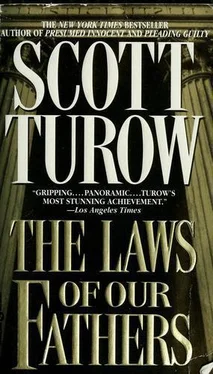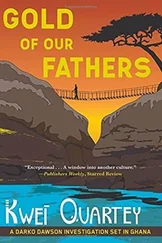Scott Turow - The Laws of our Fathers
Здесь есть возможность читать онлайн «Scott Turow - The Laws of our Fathers» весь текст электронной книги совершенно бесплатно (целиком полную версию без сокращений). В некоторых случаях можно слушать аудио, скачать через торрент в формате fb2 и присутствует краткое содержание. Жанр: Криминальный детектив, на английском языке. Описание произведения, (предисловие) а так же отзывы посетителей доступны на портале библиотеки ЛибКат.
- Название:The Laws of our Fathers
- Автор:
- Жанр:
- Год:неизвестен
- ISBN:нет данных
- Рейтинг книги:5 / 5. Голосов: 1
-
Избранное:Добавить в избранное
- Отзывы:
-
Ваша оценка:
- 100
- 1
- 2
- 3
- 4
- 5
The Laws of our Fathers: краткое содержание, описание и аннотация
Предлагаем к чтению аннотацию, описание, краткое содержание или предисловие (зависит от того, что написал сам автор книги «The Laws of our Fathers»). Если вы не нашли необходимую информацию о книге — напишите в комментариях, мы постараемся отыскать её.
The Laws of our Fathers — читать онлайн бесплатно полную книгу (весь текст) целиком
Ниже представлен текст книги, разбитый по страницам. Система сохранения места последней прочитанной страницы, позволяет с удобством читать онлайн бесплатно книгу «The Laws of our Fathers», без необходимости каждый раз заново искать на чём Вы остановились. Поставьте закладку, и сможете в любой момент перейти на страницу, на которой закончили чтение.
Интервал:
Закладка:
I don't know how many of you here know the story of how our Isaac came to be given that name. But it is, fittingly, my father's story, and the one we all shudder to recall. In March 1938, the German Army marched into Austria and brought with them their war against the Jews. Jewish businesses were emblazoned with signs and vandalized or confiscated, while 12,000 Jewish families were thrown out of their homes. The Nazis turned synagogues into smoking parlors and beat at random Jews found on the streets. On April 23, a Saturday, in Vienna, that most genteel of cities, the home of Sigmund Freud and Gustav Mahler, a group of Jews was taken to the Prater, Vienna's amusement park, and there, in the presence of the usual weekend crowd, the SS forced the Jews to their knees and made them eat the lawn. By June, more than 500 Viennese Jews had committed suicide. On the sixteenth of that month, my father, his young wife, and their four-year-old son, who had been out together for a hasty visit to a shop, were accosted by storm troops. They were informed that their home was now state property.
In the next three years they moved half a dozen times as more and more of the city was closed to Jewish residency. Jews were removed from their jobs and forced to wear the yellow star when they walked down the street. But my father remained. His mother-in-law had had a stroke and was not transportable. And emigration became increasingly difficult as time went on and the nations throughout Eastern Europe closed their borders for fear of being overrun by Austria's 180,000 Jews. More to the point, flight would have shattered some essential vision of himself. He was, very much, the man he had planned to be, the son of a shopkeeper, a silversmith, who, as I understand it, had longed to have a son who would be, as my father had become, a scholar, broadly respected at the university.
The deportation to the camps of Vienna's Jewish population came slowly at first, but by October 1941 was fully under way. With the assistance of the leaders of the Jewish community under the direction of Rabbi Murmelstein, Jews were sent off to the 'East' in batches of 1,000 in closed freight cars. My father, his wife, and his son were among the first to go. He was pleased to be sent to the concentration camp at Buchenwald, where many noted Viennese had preceded him. The boy, now seven, developed a painful ear infection on the trip. By the time they were herded off the cattle car in Buchenwald, the boy was crying nearly constantly, whimpering and moaning in pain. His mother begged the guards for medical treatment. Finally, after three days, a guard agreed, took the child from the barracks by the hand, and immediately outside the door shot him, where the boy, my brother Isaac, died. These events, which my father never once mentioned to me during his lifetime, defined him. They were with him every day. They transformed him – forgive me – deformed him, as a tree can be misshapen by tethering it as a sapling. He needed no injunction never to forget. It was from my mother that I learned what transpired, in short, unbearable conversations over the years. One of the great agonies of her Alzheimer's was that the horrible recollection of the camps survived with her far longer than anything else except, probably, her memories of me. During the stage when she could still speak of things with clarity she repeated a phrase I had heard from her from time to time. 'The best did not survive,' she said. 'Those who would not wheedle or cheat, who shared with the sick – I think they were admired to a degree, but admiration in such circumstances is a very fleeting feeling.' Then my mother, frail and enfeebled, her flesh loose, her eyes dull, but her very look still deeply familiar and precious to me, made certain to face me. 'I have lived the rest of my life recalling them,' she said. She cleared her throat. 'They are my heroes.' Death deepens my wonder at her. She was surely wrong, for my heart allows no doubt that she was among the best. But I realize that in her usual deep and delicate way she meant to communicate to me some exculpation of my father. For no matter who they were when they entered those horrible facilities, neither she nor he nor any other human being could be subjected on a prolonged basis to such confinement, such humiliation, such intense and repeated brutality, such incessant privation, fear, and constant debasement, and emerge with their humanity fully intact. I accept this. It seems obvious to me, although you can travel to corners of this city – to the towers of Grace Street or Fielder's Green – and see the lesson is not yet learned. One of the thousand morals of the story of Abraham and Isaac is that the parents' ordeal – and we all have ours – will inevitably become the child's, as my father and mother's ordeal became mine, and mine no doubt became Sarah's and Isaac's. But it is also a tale of survival and of mercy. In the end, Abraham heard his God instruct him not to set his hand against his son. Isaac was spared. He survived and surmounted. He became a parent, blind to Jacob's defects, but one who, pointedly, attempted no sacrifices of his own. I bear my father the intense gratitude I ought to. Lame and halting, he still went on. But surely we could have both done better. Here at the end, things can be put simply. My father and I often treated each other cruelly. I am sore with shame at the memory of my craziest antics – and would have been more at peace if I had seen in my father any trace of a similar regret. I wish we had negotiated some truce, some settlement. It would have been hard bargaining. No doubt, he trumped me in the category of suffering, particularly since much of mine has been self-inflicted, which, generally speaking, people of his age and experience refused to recognize as pain. But couldn't we have matched up, soul for soul, those two dead little boys, his son and mine, the Isaacs whose fathers could not save them? Isn't there a point of absolute equality in futility and despair? Yet we learn , we grow, we gain. Sarah, surely you and I have already done much better. There's a great deal in that.
So I think about Isaac – my son, my brother, my father's son, the first son of the Western faiths – and I think about the story that is told again and again. We hear it first as children, and repeat it throughout our lives. We tell it by way of apology. And warning. We tell it with some measure of hope. We tell it because we have all been the child, we have all been Isaac, and we know the part of the story that is never mentioned. For the Bible does not record Isaac's responses. We do not know if he, like Jesus, asked, Father, why have you forsaken me? We do not know if he begged, the way most of us would, for his life. We know only this: that he obeyed. That he was a child. That because he knew nothing else, he did as his father required. We know he allowed himself to be bound in rope. We know he let his father lay him on the altar of pyramided firewood which together they had raised to God. We know he watched his father on the mountaintop raise the gleaming knife above his breastbone. We know he was a child, the son of a man with a Big Idea, who in his longing and confusion, even in his final instants, could only look to his father with that eternal if foundering hope for love. Eulogy for Bernhard Weissman by Hobart Tariq Tuttle April 1,
1996
Allah, Yahweh, sweet Jesus – by whatever name we know You, Lord – take the soul of Bernhard Weissman. You caused him in his life to confront terrible wickedness. He now deserves Your eternal peace.
Were we all – all of us here – to share our memories of Bernhard Weissman, You'd hear a lot of different things. There'd be many voices. There are folks here who can tell You he was a genius in his work. Winners of the Nobel Prize in Economics invited him to their table and treated him as a peer. His granddaughter, our sweet Sarah, would tell You he was a great old guy who responded to her kindness. And You've heard Seth say he was a tough father, and I tell You, I was around to see that, and it is word.
Читать дальшеИнтервал:
Закладка:
Похожие книги на «The Laws of our Fathers»
Представляем Вашему вниманию похожие книги на «The Laws of our Fathers» списком для выбора. Мы отобрали схожую по названию и смыслу литературу в надежде предоставить читателям больше вариантов отыскать новые, интересные, ещё непрочитанные произведения.
Обсуждение, отзывы о книге «The Laws of our Fathers» и просто собственные мнения читателей. Оставьте ваши комментарии, напишите, что Вы думаете о произведении, его смысле или главных героях. Укажите что конкретно понравилось, а что нет, и почему Вы так считаете.












